Cloud Storage for Business: The Ultimate 2025 Guide
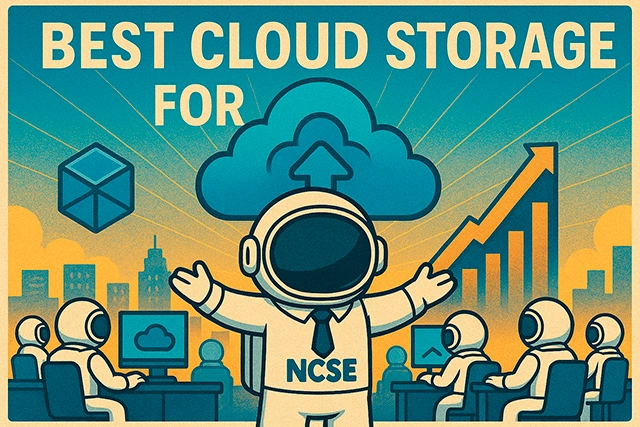
In an era where agility and remote collaboration define business success, cloud storage for business has become more than just a convenience it’s a necessity. Companies across all industries are moving away from traditional on-site servers and embracing cloud-based solutions to streamline operations, secure sensitive information, and support distributed teams.
As 2025 unfolds, the demand for the best cloud storage solutions for businesses continues to soar. Organizations, whether startups or large enterprises, require reliable, scalable, and secure platforms that can keep up with evolving technology and growing data needs.
This guide dives deep into everything you need to know about choosing the right cloud storage for business, including a detailed cloud storage providers comparison 2025, the best options for small businesses, the most secure cloud storage for enterprises, and key features to look for in business data cloud solutions. Whether you’re searching for affordable cloud backup for small businesses or robust enterprise-grade storage, we’ll help you make the smartest decision for your company’s future.
Let’s explore the top choices and how to select the best one for your business success.
Table of Contents
Why Cloud Storage Is Essential for Businesses Today
The way businesses manage data has fundamentally changed. Gone are the days when storing critical files on local servers or hard drives was enough. Today’s organizations demand instant access, real-time collaboration, and resilient backup systems to stay competitive and cloud storage for business delivers exactly that.
Here are the key reasons why cloud storage is now essential for companies of all sizes:
1. Accessibility and Flexibility
Cloud storage enables employees to access data from anywhere in the world, whether they’re working from the office, home, or on the move. This flexibility not only supports remote work trends but also ensures that teams can collaborate efficiently without being tied to a physical location.
2. Enhanced Data Security
Leading cloud providers invest heavily in robust security measures like encryption, multi-factor authentication, and compliance certifications. For businesses handling sensitive customer or financial data, leveraging secure cloud storage for enterprise is no longer optional it’s a core requirement.
3. Cost-Effective Scaling
Unlike traditional servers that require hefty upfront investments and maintenance, cloud solutions offer scalable pricing models. Businesses can pay only for the storage they need, scaling up or down as necessary. This flexibility is especially valuable for startups and growing companies looking for the best cloud storage solutions for businesses.
4. Disaster Recovery and Backup
Unexpected disasters natural, technical, or cyber-related can cripple businesses that rely solely on physical infrastructure. With cloud backup for small businesses and enterprises alike, critical data remains protected through automatic redundancy and failover systems, ensuring business continuity.
5. Improved Collaboration and Productivity
Modern cloud storage platforms integrate seamlessly with project management, CRM, and communication tools, allowing teams to work on documents simultaneously, share feedback in real-time, and speed up decision-making processes.
Best Cloud Storage Solutions for Businesses in 2025
Choosing the right cloud storage provider can make or break your company’s ability to collaborate effectively, safeguard sensitive data, and scale operations as needed. In 2025, the competition among providers is fiercer than ever, with each offering unique strengths tailored to different business needs.
Below, we highlight some of the best cloud storage solutions for businesses, carefully selected for their reliability, security, and feature-rich platforms:
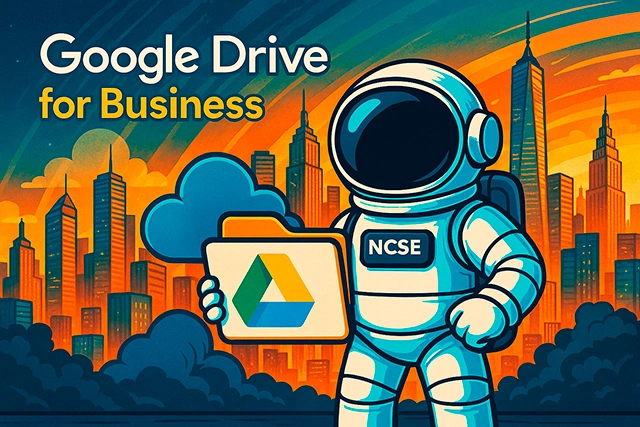
Google Drive for Business (Google Workspace)
When it comes to cloud storage for business, Google Drive for Business, now part of the broader Google Workspace ecosystem, stands as a dominant choice especially for companies prioritizing collaboration, flexibility, and ease of use.
Integrated seamlessly with popular apps like Gmail, Google Docs, Sheets, Slides, Meet, and Calendar, Google Drive enables teams to work in real-time from virtually anywhere. Whether your business is a small startup, a growing remote team, or a large-scale enterprise, Google Drive offers scalable storage solutions designed for modern business needs.
With powerful built-in AI search capabilities, easy sharing permissions, and simple admin controls, it’s no wonder Google Drive consistently ranks among the best cloud storage solutions for businesses in 2025.
Best Use Cases for Google Drive for Business
- Remote Teams: Real-time document collaboration and video conferencing.
- Startups & SMBs: Affordable entry-level plans with easy scalability.
- Education and Nonprofits: Special pricing and tools for collaborative learning.
- Enterprises: Advanced admin controls, security settings, and compliance certifications (like ISO 27001, GDPR).
Unique Selling Points of Google Drive
- Seamless Collaboration: Multiple users can edit, comment, and review documents in real-time without version confusion.
- Smart Search with AI: Google’s advanced search makes finding files lightning fast even without knowing the exact filename.
- Third-Party App Integrations: Easily connects with productivity tools like Slack, Asana, Salesforce, Trello, and more.
- Robust Security and Compliance: Two-factor authentication (2FA), data loss prevention (DLP), encryption at rest and in transit.
- Scalable Storage: From 30GB/user for basic plans up to unlimited storage for premium tiers.
Pricing
- Business Starter: $6/user/month (30GB cloud storage)
- Business Standard: $12/user/month (2TB per user)
- Business Plus: $18/user/month (5TB per user)
- Enterprise: Custom pricing with unlimited storage
(Visit Google Workspace Pricing for latest details.)
Pros & Cons
| ✅ Pros | ❌ Cons |
|---|---|
| Seamless integration with Gmail, Docs, Sheets, and Meet | Storage limitations on basic Starter plan (30GB/user) |
| Real-time editing and file sharing for teams | Advanced features mostly available on higher tiers |
| Excellent AI-powered search and organization | Occasional sync issues with extremely large files |
| Strong mobile app support for Android and iOS | Some learning curve for users unfamiliar with Google environment |
Each of these providers offers a unique blend of features, pricing, and scalability options. Your choice should align with your company’s specific needs, whether that means maximizing collaboration, securing sensitive enterprise data, or ensuring effortless file synchronization.
Up next, we’ll dive deeper with a full cloud storage providers comparison 2025 to help you see side-by-side which platform fits your business best.
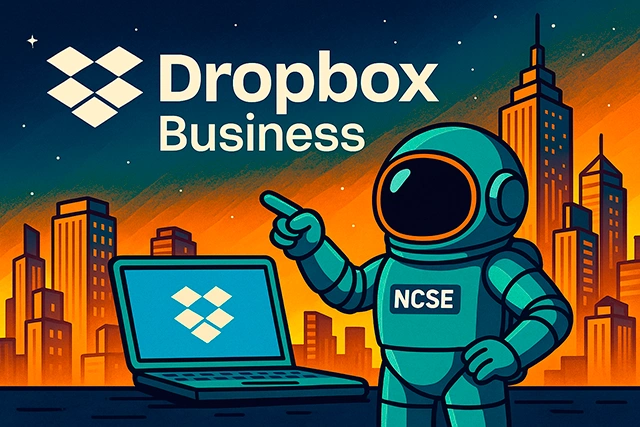
Dropbox Business
When it comes to user-friendly design and reliable file synchronization, Dropbox Business has been a trusted name for over a decade. Originally known as a consumer-focused file storage service, Dropbox has evolved into one of the most powerful cloud storage for business solutions available today, offering robust collaboration features and excellent third-party integrations.
Dropbox Business makes file management incredibly intuitive, especially for creative teams working with large media files like videos, design projects, and marketing content. Its Smart Sync feature ensures that users can access massive libraries without consuming local storage, while its reliable file recovery options safeguard against accidental deletions.
In 2025, Dropbox continues to position itself among the best cloud storage solutions for businesses, combining ease of use with enterprise-grade features suitable for companies of all sizes.
Best Use Cases for Dropbox Business
- Creative Agencies: Manage large media files across teams effortlessly.
- Startups & SMBs: Need simple yet powerful file sharing with easy setup.
- Remote and Hybrid Teams: Collaborate seamlessly without infrastructure overhead.
- Enterprises: Use Dropbox Advanced or Enterprise plans for custom compliance and admin control.
Unique Selling Points of Dropbox Business
- Smart Sync Technology: Access all files and folders without filling up hard drives.
- Extensive Third-Party Integrations: Integrates with Zoom, Slack, Asana, Trello, Salesforce, and hundreds more.
- Version History and Recovery: Recover deleted files or previous versions easily (up to 180 days).
- Team Collaboration Tools: Shared folders, team spaces, admin-level user permissions.
- Security Compliance: Meets HIPAA, GDPR, ISO 27001, and SOC 2 requirements.
Pricing
- Standard Plan: $15/user/month (5TB of storage shared among team members)
- Advanced Plan: $24/user/month (As much space as needed + advanced admin controls)
- Enterprise Plan: Custom pricing with unlimited features
(Visit Dropbox Business Pricing for latest details.)
Pros & Cons
| ✅ Pros | ❌ Cons |
|---|---|
| Very intuitive interface with minimal learning curve | Higher starting price compared to basic business solutions |
| Powerful Smart Sync saves local storage space | Limited real-time document editing compared to Google Drive |
| Strong third-party app ecosystem for integrations | Some collaboration features require third-party apps (like Paper) |
| Excellent file recovery and versioning options |
💬 Tip: Dropbox Business is perfect for businesses that need reliable file storage, backup, and flexible access without overcomplicating setup or IT resources.
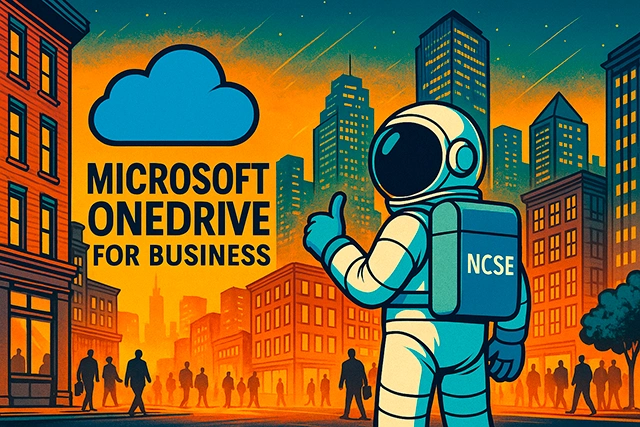
Microsoft OneDrive for Business
For companies deeply integrated into the Microsoft ecosystem, OneDrive for Business is a natural choice. As a key component of Microsoft 365, OneDrive offers seamless access to cloud storage across Word, Excel, PowerPoint, Outlook, and Microsoft Teams, making it a powerhouse for document management and real-time collaboration.
With the rise of hybrid work in 2025, OneDrive’s ability to synchronize files across multiple devices, combined with enterprise-grade security and compliance features, positions it as a leading cloud storage for business solution for small to large enterprises alike.
Whether you are a small business needing affordable storage or a multinational corporation looking for data residency control and advanced security, Microsoft OneDrive delivers flexibility, reliability, and deep integration.
Best Use Cases for OneDrive for Business
- Small to Medium Businesses (SMBs): Affordable collaboration and storage bundled with Microsoft 365 apps.
- Large Enterprises: Advanced compliance features, DLP (Data Loss Prevention), and security configurations.
- Hybrid/Remote Teams: Easy sharing and real-time co-authoring of documents through Teams.
- Education and Government Organizations: Specialized plans for compliance and multi-user environments.
Unique Selling Points of OneDrive for Business
- Seamless Office 365 Integration: Access and edit Word, Excel, PowerPoint documents directly within the cloud.
- Advanced Security Controls: Encryption in transit and at rest, ransomware detection, and recovery options.
- Strong Mobile Experience: Feature-rich apps for iOS and Android devices.
- Granular Sharing and Access Control: Share files internally or externally with customizable permissions.
- Personal Vault: Extra-secure storage area for sensitive documents requiring two-factor authentication.
Pricing
- OneDrive for Business Plan 1: $5/user/month (1TB per user)
- OneDrive for Business Plan 2: $10/user/month (Unlimited storage + advanced security features)
- Microsoft 365 Business Basic/Standard/Premium: Bundled plans starting from $6/user/month including OneDrive and full Office apps.
(Visit Microsoft OneDrive for Business Pricing for latest offers.)
Pros & Cons
| ✅ Pros | ❌ Cons |
|---|---|
| Deep integration with Microsoft 365 and Office apps | Interface and settings can be confusing for new users |
| Competitive pricing for SMBs and enterprises | Occasional syncing issues for very large file batches |
| Excellent collaboration tools with Teams and SharePoint | Limited backup recovery without advanced plan |
| Strong security and compliance options for regulated industries |
💬 Tip: If your business already uses Word, Excel, Outlook, and Teams daily, integrating OneDrive as your business data cloud solution creates a seamless, productive workflow without needing extra training or setup.
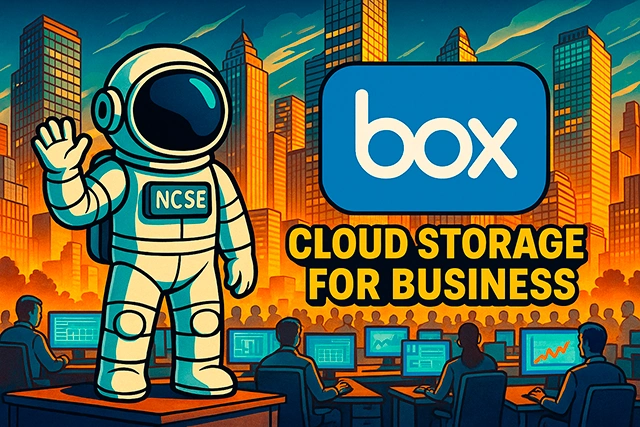
Box for Business
When data security and regulatory compliance are top priorities, Box for Business emerges as a standout choice. Designed with enterprises in mind, Box offers powerful content management, secure file sharing, and advanced workflow automation all packed within a user-friendly platform.
In 2025, as businesses become more concerned with GDPR, HIPAA, CCPA, and other privacy regulations, Box continues to evolve as a leading cloud storage for business platform tailored for sensitive industries like healthcare, finance, and legal.
Unlike traditional file storage services, Box positions itself as a content management system (CMS) in the cloud, providing not just storage, but also collaboration, process automation, and deep integrations with major business tools.
Best Use Cases for Box for Business
- Large Enterprises: Companies with strict security, data governance, and regulatory needs.
- Healthcare and Financial Institutions: Industries requiring HIPAA, GDPR, and SOC2 compliance.
- Remote and Hybrid Teams: Centralized file management with real-time access controls.
- Legal Firms: Secure document management and audit trails.
Unique Selling Points of Box for Business
- Security-First Approach: End-to-end encryption, granular access controls, watermarking, legal holds, and custom data residency.
- Workflow Automation: Automate routine tasks like document approvals and feedback loops.
- Massive App Integrations: Seamless connections with Slack, Zoom, Microsoft Teams, Salesforce, and 1,500+ apps.
- Advanced Collaboration Tools: Secure file sharing, real-time commenting, and Box Notes for document creation.
- Compliance Management: Meet complex requirements easily across industries with certified infrastructure.
Pricing
- Business Plan: $17.30/user/month (100GB maximum file size, unlimited storage)
- Business Plus Plan: $28.70/user/month (Advanced security and integrations)
- Enterprise Plan: $40.30 pricing (Full security, compliance, and governance suite)
(Visit Box for Business Pricing for updated packages.)
Pros & Cons
| ✅ Pros | ❌ Cons |
|---|---|
| Industry-leading security and compliance certifications (HIPAA, GDPR, SOC2) | Higher learning curve compared to simpler cloud storage platforms |
| Advanced workflow automation and customizable templates | Higher starting cost compared to competitors like OneDrive |
| Integration with 1,500+ third-party apps | Basic users may not fully utilize advanced features |
| Excellent administrative controls for large teams |
💬 Tip: If security, compliance, and content governance are your top concerns, Box for Business is one of the safest investments for modern enterprises managing complex workflows.
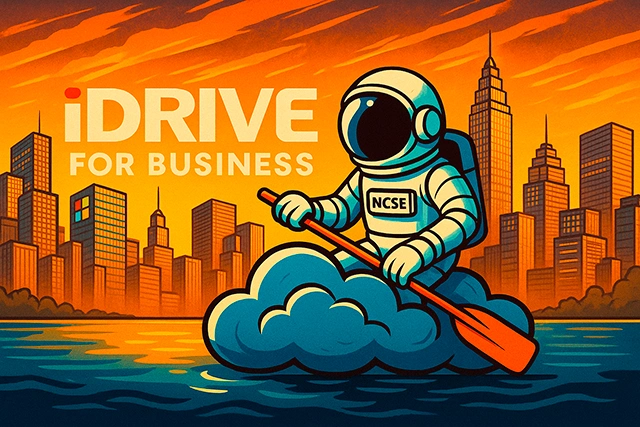
iDrive for Business
If your top priorities are reliable cloud backups, disaster recovery, and affordable pricing, iDrive for Business is one of the best options available in 2025. Unlike collaboration-first platforms, iDrive focuses heavily on secure data backup and protection, offering businesses peace of mind when it comes to data security and disaster preparedness.
With its ability to back up unlimited devices under a single account including PCs, Macs, iPhones, Android devices, and even servers iDrive stands out as an all-in-one solution for businesses needing cloud storage for business without paying massive enterprise-level prices.
While iDrive may lack the deep collaboration tools of Google Drive or Dropbox, its strength lies in safeguarding your critical files against ransomware attacks, accidental deletions, and hardware failures.
Best Use Cases for iDrive for Business
- Small to Medium-Sized Businesses (SMBs): Affordable plans for extensive backup coverage.
- Healthcare, Legal, and Financial Sectors: Industries requiring secure, compliant data storage.
- Companies Prioritizing Data Protection: Those needing regular, automated backups with quick recovery options.
- Remote and Distributed Teams: Back up devices across locations without expensive infrastructure.
Unique Selling Points of iDrive for Business
- Unlimited Device Backups: One account can back up computers, mobile devices, NAS, and servers.
- Snapshot and Versioning: Protect against ransomware by restoring data to a previous “clean” version.
- Real-Time Sync: Sync files instantly across linked devices.
- Hybrid Backup Capability: Combine local and cloud backups for extra protection.
- Military-Grade Security: 256-bit AES encryption with optional private key management.
Pricing
- Business 250GB Plan: $99.50/year
- Business 500GB Plan: $199.50/year
- Business 1.25TB Plan: $499.50/year
- Custom Enterprise Plans: Available for businesses requiring more storage or specific compliance needs.
(Visit iDrive for Business Pricing for latest offers.)
Pros & Cons
| ✅ Pros | ❌ Cons |
|---|---|
| Affordable pricing for small and growing businesses | Less emphasis on real-time document collaboration |
| Unlimited device support per account | Interface feels outdated compared to newer competitors |
| Strong backup and recovery options, including ransomware protection | Initial setup and configuration can be technical for non-IT users |
| Hybrid backup (local + cloud) flexibility |
💬 Tip: If your priority is to protect sensitive data and maintain regular backups across all your company’s devices without breaking the budget iDrive for Business delivers unbeatable value.
How to Choose the Best Cloud Storage for Your Business
Selecting the right cloud storage for business isn’t just about choosing the biggest name or the cheapest option. Every company has unique needs, from team size to security requirements, from collaboration tools to budget limitations.
Here’s a step-by-step guide to help you choose the right solution for your business in 2025:
1. Define Your Business Needs
Small businesses often prioritize affordable pricing and ease of use.
Large enterprises may require high-end security, compliance certifications, and advanced admin controls.
Creative teams need strong file versioning, large storage capacity, and real-time collaboration.
Identify your top priorities whether it’s storage space, security, collaboration, backup, or compliance.
2. Understand Your Storage and Backup Requirements
Estimate how much storage your team currently needs and how much it might need in the future.
If data backup is a priority, look for providers offering version history, real-time sync, and hybrid backup options.
Tip: Always choose a provider that offers scalable plans so you don’t outgrow your storage.
3. Prioritize Security and Compliance
Security should never be compromised. Look for features like:
- End-to-end encryption
- Two-Factor Authentication (2FA)
- Ransomware protection
- HIPAA, GDPR, or SOC 2 compliance
Secure cloud storage for enterprise businesses is essential if you handle sensitive client or financial data.
4. Evaluate Integration Capabilities
Choose a cloud storage provider that integrates smoothly with the software your team already uses:
- Google Drive ➔ integrates with Google Workspace
- OneDrive ➔ integrates with Microsoft 365
- Dropbox ➔ integrates with Zoom, Slack, Trello
- Box ➔ integrates with Salesforce, Microsoft Teams, Google Workspace
The better the integration, the higher your team’s productivity and efficiency.
5. Consider Pricing and Hidden Costs
Don’t just look at monthly subscription fees analyze:
- Storage limits per user
- Extra charges for exceeding storage quotas
- Additional costs for advanced features like workflow automation or advanced security
Affordable business data cloud solutions are great, but transparency is key to avoiding unexpected expenses later on.
6. Take Advantage of Free Trials
Almost all leading cloud storage providers offer free trials or demo accounts.
Test the platform using your real workflow to evaluate:
- Ease of setup
- File sync speed
- Collaboration features
- Admin panel usability
Tip: Always test with a free trial before committing to long-term contracts or annual billing plans.
Common Mistakes to Avoid When Choosing Cloud Storage for Business
Choosing the wrong cloud storage provider can be costly not just in money, but in lost data, frustrated teams, and missed business opportunities. Here are some of the most common mistakes businesses make, and how you can avoid them:
1. Prioritizing Price Over Features
While affordable plans are attractive, picking the cheapest option without evaluating key features like security, backup, scalability, and integration can hurt your business in the long run.
Tip: Focus on long-term value, not just upfront cost.
2. Ignoring Compliance Requirements
Businesses handling sensitive information like healthcare, legal, or financial data must comply with regulations such as HIPAA or GDPR. Choosing a provider without proper certifications could lead to hefty fines.
Tip: Always check for compliance badges before signing up.
3. Underestimating Storage Growth
Today’s needs may look small, but as your business grows, so does your data. Choosing a plan that can’t scale easily can lead to expensive migrations later.
Tip: Choose a provider offering flexible upgrades and scalable storage.
4. Overlooking User Experience
If your team struggles with a clunky or confusing platform, productivity will suffer. A user-friendly interface matters more than you think.
Tip: Use free trials to test the platform’s real-world usability.
5. Not Planning for Backup and Recovery
Cloud storage should not replace dedicated backups. Without versioning and recovery options, you risk permanent data loss in case of ransomware or accidental deletions.
Tip: Select providers that offer hybrid backup and easy restore points.
Frequently Asked Questions (FAQs) About Cloud Storage for Business
Is cloud storage safe for businesses?
Yes, leading providers implement strong encryption protocols, regular security updates, and compliance certifications. However, it’s crucial to choose reputable providers and configure settings properly, such as enabling two-factor authentication.
How much cloud storage do small businesses typically need?
It varies, but most small businesses start comfortably with 1TB to 2TB of storage, depending on the volume of files, media content, and collaboration needs.
Can I migrate data from one cloud provider to another?
Yes, but it can be technical. Some providers offer built-in migration tools or third-party services to help move data securely without downtime.
What happens if a cloud storage provider experiences downtime?
Top providers offer redundancy, multiple data centers, and uptime guarantees (often 99.9% or higher). Always read the Service Level Agreement (SLA) to understand downtime protections.
What’s the difference between cloud backup and cloud storage?
Cloud storage focuses on real-time access and collaboration, while cloud backup is about creating secure copies of your data for recovery purposes. Ideally, businesses should use both.
Final Thoughts: Finding the Best Cloud Storage Solution for Your Business
Choosing the right cloud storage for business in 2025 is critical for maintaining operational efficiency, enhancing collaboration, protecting valuable data, and scaling your company’s digital infrastructure.
Remember:
- Start by defining your business priorities.
- Focus on security, scalability, and integration.
- Don’t hesitate to trial multiple platforms before committing.
- Always think long-term your future growth depends on it.
Whether you’re a startup, a creative agency, or a multinational enterprise, there’s a perfect cloud solution waiting to support your goals.
Ready to take your business data to the next level?
Explore the best cloud storage solutions today and secure your digital future!







